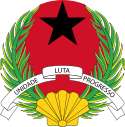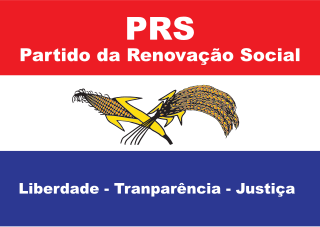This article needs to be updated.(June 2023) |
 |
|---|
The National Unity Party (Portuguese : Partido da Unidade Nacional, PUN) was a political party in Guinea-Bissau.
This article needs to be updated.(June 2023) |
 |
|---|
The National Unity Party (Portuguese : Partido da Unidade Nacional, PUN) was a political party in Guinea-Bissau.
The party was established by Idrissa Djaló on 26 July 2001. [1] In the 2004 parliamentary elections, the party received 1.46% of the vote and failed to win a seat. [1] In the 2005 presidential election, Djaló finished eighth with 0.8% of the vote.
The party boycotted the 2008 parliamentary elections, with Djaló claiming that "the ballot will not resolve any of the persistent great problems in the country". [2] It did not contest presidential elections in 2009 or 2012, but supported the 2012 military coup. [2]

The politics of Guinea-Bissau take place in a framework of a semi-presidential representative democratic republic, with a multi-party system, wherein the President is head of state and the Prime Minister is head of government. Executive power is exercised by the government. Legislative power is vested in both the government and the National People's Assembly.

Kumba Ialá Embaló, also spelled Yalá, was a Bissau-Guinean politician who was president from 17 February 2000 until he was deposed in a bloodless military coup on 14 September 2003. He belonged to the Balanta ethnic group and was President of the Social Renewal Party (PRS). In 2008 he converted to Islam and took the name Mohamed Ialá Embaló. He was the founder of the Party for Social Renewal. In 2014, Ialá died from a cardiopulmonary arrest.

The African Party of Independence of Cape Verde is a democratic socialist political party in Cape Verde. It was the sole legal party in the country from 1981 to 1990. Its members are nicknamed "os tambarinas" in Portuguese, and they identify themselves with the color yellow.

Presidential elections were held in Guinea-Bissau on 19 June 2005, with a second round runoff on 24 July. The elections marked the end of a transition to democratic rule after the previously elected government was overthrown in a September 2003 military coup led by General Veríssimo Correia Seabra. The result was a victory for former president and independent candidate João Bernardo Vieira.

The Workers' Party is a socialist political party in Guinea-Bissau.
The United Social Democratic Party is a centre-left social democratic political party in Guinea-Bissau.

The Union for Change is a political alliance in Guinea-Bissau.

The Resistance of Guinea-Bissau-Bafatá Movement is a political party in Guinea-Bissau. Once the main opposition organisation in the country, it is today a minor party without parliamentary representation.

The National Union for Democracy and Progress is a political party in Guinea-Bissau.

The Social Renewal Party is a political party in Guinea-Bissau. It is one of the country's leading parties and is currently the main opposition party.
Idrissa Djaló is a Bissau-Guinean politician and leader of the National Unity Party (PUN).
Mamadu Iaia Djaló was a Guinea-Bissau politician, and the founder and leader of the New Democracy Party.

The Manifest Party of the People is a political party in Guinea-Bissau.

The Guinean Civic Forum–Social Democracy is a political party in Guinea-Bissau.

Presidential elections were held in Guinea-Bissau on 28 June 2009 following the assassination of President João Bernardo Vieira on 2 March 2009. As no candidate won a majority in the first round, a second round was held on 26 July 2009 between the two leading candidates, Malam Bacai Sanhá of the governing African Party for the Independence of Guinea and Cape Verde (PAIGC) and opposition leader Kumba Ialá. Sanhá won with a substantial majority in the second round, according to official results.

The New Democracy Party is a political party in Guinea-Bissau.

The Guinean League for Ecological Protection is a political party in Guinea-Bissau.

The Social Democratic Party is a political party in Guinea-Bissau.
The following lists events that happened during 2012 in Guinea-Bissau.

Presidential elections were held in Guinea-Bissau on 24 November 2019. As no candidate received a majority of the vote, a second round was held on 29 December. Incumbent president José Mário Vaz finished fourth in the first round of voting, failing to progress to the runoff. Umaro Sissoco Embaló won the second round with 54% of the vote, becoming the first president to be elected without the backing of the PAIGC since 1999–2000.